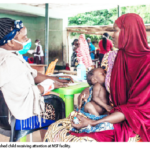New Study Reveals High Sugar-Sweetened Beverage Consumption Worldwide with Regional Disparities

A recent study conducted by researchers from the Friedman School of Nutrition Science and Policy has shed light on the consumption of sugar-sweetened beverages across the globe. The findings underscore a significant rise in sugar-sweetened beverage intake, revealing that certain regions, including Sub-Saharan Africa, South Asia, Latin America, and the Caribbean, witnessed higher consumption levels among well-educated adults compared to the Middle East/North Africa. This study, which spanned from 2005 to 2018, offers insights into the critical role of diet and beverage choices in health outcomes, including the concerning link between sugar-sweetened beverages and conditions like obesity, malnutrition, cardiovascular disease, cancer, and diabetes.
Global Trends in Sugar-Sweetened Beverage Consumption
Between 2005 and 2018, the global consumption of sugar-sweetened beverages witnessed a 16 percent increase. Notably, Sub-Saharan Africa experienced the most substantial surge, with a staggering 41 percent rise in consumption. Conversely, Latin America/Caribbean and high-income countries demonstrated decreasing trends. The study delved into the consumption habits of urban, highly educated individuals and found that Sub-Saharan Africa recorded 12.4 servings of sugar-sweetened beverages per week, while Latin America/the Caribbean averaged 8.5 servings per week, marking them among the world’s highest consumers of sugary drinks per capita.
Regional Disparities in Sugar-Sweetened Beverage Consumption
The study’s data, published in the journal Nature Communications, provides a comprehensive examination of sugar-sweetened beverage consumption among adults across 185 countries from 1990 to 2018. It revealed that Mexico topped the list for weekly sweetened drink servings with 8.9 servings, followed by Ethiopia (7.1), the United States (4.9), and Nigeria (4.9). On the contrary, India, China, and Bangladesh were at the lower end of the spectrum, each consuming only 0.2 servings per week.
Factors Influencing Consumption Trends
The study uncovered differences in sugar-sweetened beverage consumption based on factors such as gender, age, and rural/urban residency. Younger adults in specific regions emerged as higher consumers of sugar-sweetened beverages. Surprisingly, some rural areas exhibited higher intake than urban areas, highlighting the complex interplay of education level and socioeconomic status in shaping consumption patterns. Moreover, the research revealed a correlation between the sociodemographic development index (SDI) and sugar-sweetened beverage consumption, pointing to national-level disparities.
Implications for Public Health Policies
The study’s results carry significant implications for public health policies and interventions. High sugar-sweetened beverage consumption has been associated with a range of health issues, including cardiovascular disease, diabetes, dental problems, and cancer. With a growing awareness of the detrimental impact of sugary drinks, the findings from this study can inform the development of guidelines, interventions, and policies aimed at limiting sugar-sweetened beverage intake within recommended limits. Potential measures include the introduction of warning labels, taxation, nutrition education initiatives, and marketing standards.
Addressing Discrepancies for Improved Health
As the study highlights, addressing the disparities in sugar-sweetened beverage consumption is essential to alleviate the global burden of health problems associated with their intake. The findings serve as a valuable foundation for further research and the development of targeted policies and initiatives to tackle the health issues linked to sugar-sweetened beverages. By understanding the regional variations and the influence of various sociodemographic factors, it becomes possible to tailor interventions effectively, ultimately promoting better health outcomes worldwide.



